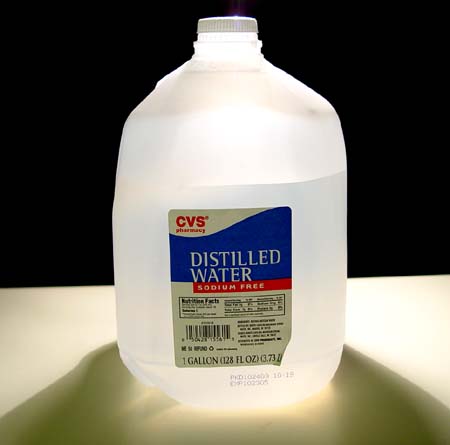Purified water is water that has been mechanically filtered or processed to remove impurities and make it suitable for use. Distillation involves boiling the water and then condensing the steam into a clean container. You can compare the deionized water vs distilled water , but to say that the distilled water is the same as deionized water is a mistake.
The terms “ distilled water ” and “ deionized water ” are often misunderstood. In this article, you can find the explanation to understand the differences and similarities of these .

Curious about the differences between deionized water and distilled water ? Both are high purity water, but there are differences. Learn more at US Water Systems. Distilled and deionized water are two forms of purified water used in laboratory research. Get expert to your questions in Water , Maine and Values and more on ResearchGate, the professional network for scientists. I read some responses on here to what are the differences between DI Water and distilled water.
The reason I ask is that we use DI Water for cleaning parts on the Ion Implanters (semi-conductor field). Why not regular water or distilled?

Also I have been told not to drink DI Water ? Choosing the right water for your cosmetics and lab is confusing – particularly when you can choose between demineralize distilled and deionized water. Deionized water is pure water (H2O) meaning it has no charge. Because it does not contain ions, deionized water does not conduct electricity as well as tap water. Water is usually deionized by using an ion exchange process. It is produced by boiling water into steam and then condensing the steam.
Distilled water is highly purified water that does not contain any salts. As a result, organic substances having boiling point less than that of water and oils present in wa. Find MSDS or SDS, a COA, data sheets and more information. Most of you would agree that drinking unfiltered tap water could be hazardous to your health because of things like. Many health fanatics, however, are often surprised to hear me say that drinking distilled water on a regular, daily basis is potentially dangerous.
Paavo Airola wrote about. However, deionized water has chemical and electrical properties that make it the optimal choice for cooling when the liquid circuit contains micro-channels or when sensitive electronics are involved. Tap water meets the needs of most liquid-cooling applications. As the name implies, DI water has an . The water is bottled from an megaohm recirculating loop that includes reverse osmosis, ion exchange and UV bacteria reduction.
The initial water source is not from distillation.

COconverts to carbonic acid and . Understanding how and why this water type is preferable. Deionization (DI) is the removal of all ionized minerals and salts (both organic and inorganic) from a solution through the process of ion exchange. Because most non-particulate water impurities are dissolved salts, deionization produces a high purity water that is generally similar to distilled water. Compared to distillation .